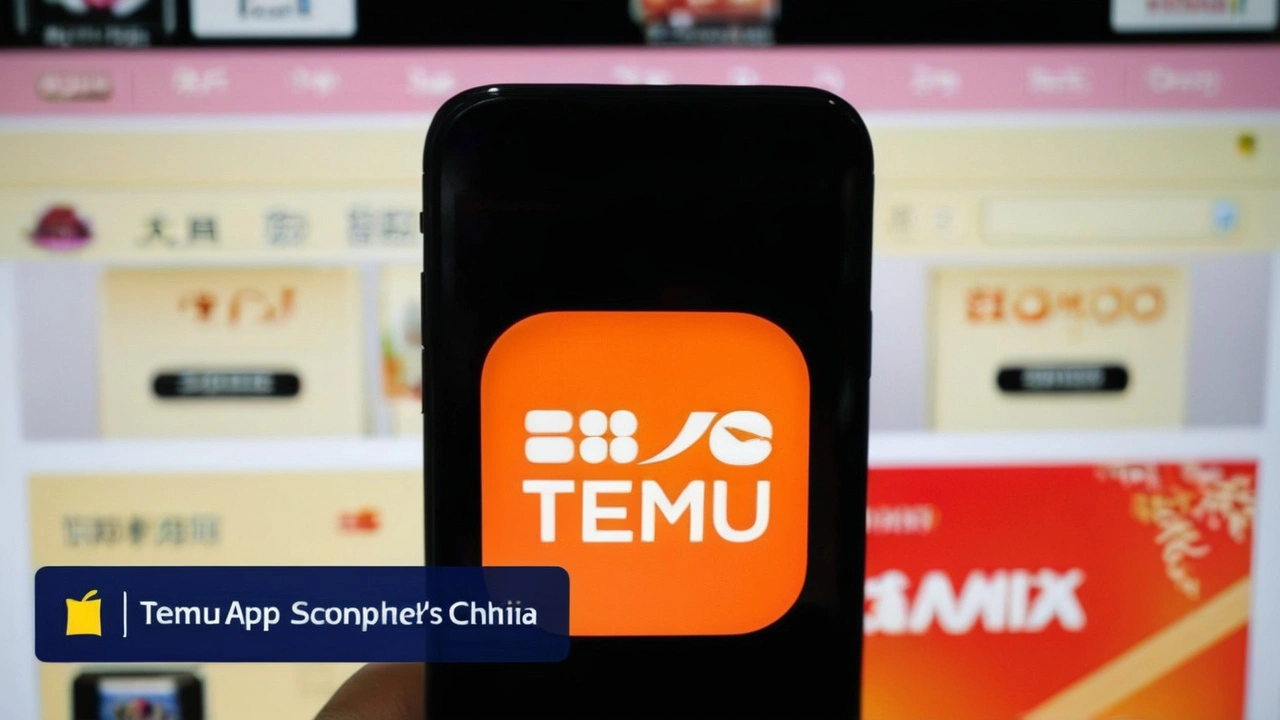Introduction
In the ever-volatile landscape of global wealth, few ascents have been as meteoric as that of Colin Huang. The founder of PDD Holdings, Huang has been named China's richest man, overtaking other prominent business magnates. According to the Bloomberg Billionaires Index, his net worth has surged to an impressive $48.6 billion, a testament to the resilience and adaptability of his business ventures.
Huang’s rise to the top is not just a milestone in his own life but also a significant event in the broader narrative of China's tech and e-commerce sectors. His company, PDD Holdings, owns the burgeoning e-commerce platforms Temu and Pinduoduo. These platforms have revolutionized online retail by offering ultra-low-cost goods that have attracted millions of users both domestically and abroad. The story of Colin Huang is one of innovation, perseverance, and a keen understanding of market dynamics.
The Journey of Colin Huang
Colin Huang was born in 1980 in the scenic city of Hangzhou, known for its picturesque West Lake and historic sites. Even as a teenager, Huang showcased an extraordinary talent in mathematics, a skill that would later bolster his entrepreneurial endeavors. He graduated from Zhejiang University with a major in computer science, propelling him into a burgeoning tech industry that was on the cusp of transforming China.
Huang's early career saw him working with Google China, where he gained invaluable experience and insights into the tech realm. However, his entrepreneurial spirit led him to venture out on his own. In 2015, he founded Pinduoduo, a unique e-commerce platform that has since become a household name in China. Unlike traditional e-commerce giants, Pinduoduo focuses on group buying, allowing users to team up and make bulk purchases at significantly lower prices. This innovative approach quickly garnered a massive user base, and the platform's popularity soared.
Pinduoduo's Unique Business Model
Pinduoduo’s business model is unique and somewhat unconventional in the retail industry. While most e-commerce platforms focus on individual purchases, Pinduoduo encourages social shopping. Users can invite friends and family to join them in making bulk purchases, thereby unlocking substantial discounts. The platform offers a wide range of products, from household essentials to luxury items, all at significantly reduced prices.
This model not only tapped into the consumer desire for bargains but also created a sense of community among shoppers. The platform's success can be attributed to its ability to blend social interaction with shopping, making it a fun and engaging experience. Furthermore, Pinduoduo employs sophisticated algorithms to offer personalized recommendations, enhancing user satisfaction and driving repeat purchases.
Another critical factor behind Pinduoduo's success is its focus on rural and less affluent markets in China. By catering to segments of the population that were previously underserved by other e-commerce giants, Pinduoduo managed to capture a loyal and growing customer base. The company also leverages partnerships with farms and local suppliers to provide fresh produce and agricultural products at competitive prices, further broadening its appeal.
Temu: Expanding Horizons
Building on the success of Pinduoduo, Huang launched Temu in the United States in 2022. Temu follows a similar low-cost model but aims to capture the international market. The platform has quickly gained traction, attracting a dedicated consumer base with its affordable prices and wide product range. From electronics to fashion, Temu offers American consumers access to high-quality goods manufactured and shipped from China.
However, Temu's rapid growth has not been without controversy. The platform has faced accusations of unfair commercial practices and lax safety standards. Consumer groups in Europe have alleged that Temu manipulates shoppers into spending more, while South Korean regulators have opened an investigation into the company's advertising practices. These challenges highlight the complexities of expanding into international markets and navigating different regulatory environments.
Despite these hurdles, Temu has bolstered PDD Holdings' financial performance. The company recently announced that its first-quarter net profit more than tripled year-on-year, a remarkable achievement in a competitive industry. With its US-listed shares closing at $138.02 apiece, PDD Holdings now boasts a market capitalization of $191.68 billion. These figures underscore the company's robust growth trajectory and its potential for future expansion.
Huang's Position in the Wealth Hierarchy
Colin Huang’s current net worth of $48.6 billion places him as the 25th wealthiest person in the world, according to the Bloomberg Billionaires Index. This remarkable feat has seen him surpassing Zhong Shanshan, the previous holder of China's richest man title since April 2021. Zhong, the chairman of beverage giant Nongfu Spring, had enjoyed a prolonged stay at the top due to the company's dominant market position.
Close behind Huang in the rankings are other tech titans like Ma Huateng, known as Pony Ma, the head of Tencent, and Zhang Yiming, the founder of ByteDance, the parent company of TikTok. The competition among these industry leaders is fierce, with each seeking to innovate and expand their influence in a rapidly evolving tech landscape. Huang's ascension in this context highlights not only his personal achievements but also the dynamic nature of China's tech industry.
Challenges and Future Prospects
Despite his immense wealth and success, Huang faces several challenges in maintaining his position at the top. The competitive nature of the e-commerce industry means that Pinduoduo and Temu must continuously innovate to stay ahead. Moreover, regulatory scrutiny in both domestic and international markets could pose significant hurdles. The accusations of unfair practices and safety concerns need to be addressed to maintain consumer trust and sustain growth.
Furthermore, the global economic landscape is fraught with uncertainties. Trade tensions, supply chain disruptions, and fluctuating market conditions could impact PDD Holdings' operations and profitability. However, Huang's track record of navigating challenges and capitalizing on opportunities suggests that he is well-equipped to steer his company through these uncertainties.

Conclusion
Colin Huang's rise to become China's richest man is a remarkable story of entrepreneurial spirit, innovation, and strategic vision. From his humble beginnings in Hangzhou to founding one of the most successful e-commerce platforms in China, Huang's journey is an inspiration to aspiring entrepreneurs worldwide. His ability to understand market dynamics, leverage technology, and create value for consumers has set him apart in a highly competitive industry.
As PDD Holdings continues to expand and evolve, the world will be watching closely. Whether it is addressing regulatory challenges, exploring new markets, or driving technological innovation, Huang's leadership will undoubtedly play a crucial role in shaping the future of e-commerce. His story is a testament to the potential of visionary entrepreneurship and the transformative power of technology in the modern economy.

mark sweeney
August 10, 2024 AT 19:15Look, everyone’s busy worshipping the new “richest man” like he’s a deity of discount sorcery, but the truth is more banal: a lot of his empire runs on cheap labor and razor‑thin margins, not some mystical market wisdom. By glorifying the guy you ignore the millions of suppliers who get squeezed daily.
randy mcgrath
August 10, 2024 AT 19:21I get where you’re coming from, but it’s also fair to note that turning a low‑cost model into a global platform takes serious logistical skill. While the labor concerns are valid, many consumers actually benefit from the price accessibility.
Frankie Mobley
August 10, 2024 AT 19:46PDD’s model is interesting because it brings group buying to people who usually can’t afford bulk purchases. By letting friends combine orders, they lower shipping costs and pass savings on to shoppers.
ashli john
August 10, 2024 AT 19:48That’s a great point about community shopping it really helps everyone
Kim Chase
August 10, 2024 AT 20:03I think it’s cool how they’re reaching out to rural areas – they’re not just focusing on big city markets, they’re giving smaller towns a chance to get the same deals as everyone else.
David Werner
August 10, 2024 AT 20:13There’s a hidden layer to this whole expansion that most people choose to ignore. The regulatory bodies are not just passive observers; they’re actively being co-opted by powerful interests.
Every time Temu pushes into a new market, there’s a silent handshake with local lobbyists, ensuring that any potential crackdown is muted.
The safety concerns raised by consumer groups are conveniently downplayed, suggesting a coordinated media strategy to keep the narrative positive.
What’s more, the supply chain is riddled with opaque subcontractors, making it nearly impossible to trace the origin of many products.
This opacity is intentional, masking labor abuses that would otherwise spark outrage.
Even the algorithmic pricing tactics are designed to create artificial scarcity, driving users to purchase more than they need.
By manipulating perceived demand, the platform inflates its own valuation, benefitting insiders while the average shopper pays the hidden costs.
International regulators are being lobbied to adopt looser standards under the guise of fostering trade, but the underlying motive is clear – unbridled market dominance.
The recent tripling of profits is less a testament to brilliant strategy and more evidence of systemic exploitation.
It’s a classic case of wealth accumulation through regulatory capture and consumer deception.
If you peel back the layers, you see a pattern repeated across multiple tech giants, all feeding into a larger agenda of economic control.
People celebrate the billionaire status without questioning the moral price of that success.
History will likely judge this era as one where profit was prioritized over people, and the veil of innovation was a convenient cover.
Ultimately, the real question isn’t how Huang became the richest, but who profits from the structures he’s built.
Paul KEIL
August 10, 2024 AT 20:36From a strategic standpoint, Huang's ascendancy exemplifies disruptive scalability leveraging network effects and price elasticities, a textbook case of hypercompetitive market penetration.
Horace Wormely
August 10, 2024 AT 20:46Actually, the previous comment contains a comma splice; it should be split into two separate sentences.